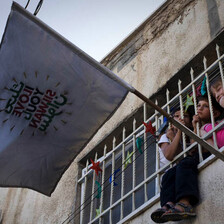The Electronic Intifada Silwan 23 November 2011

The Somrein family outside their home, slated for eviction.
The Electronic IntifadaIn the Silwan neighborhood of occupied East Jerusalem, another house is about to bite the dust. The odds are certainly stacked against the Somrein family, which has received eviction orders and a series of bills amounting to more than two million shekels (over $500,000) worth of “back rent.” Back rent for what? For living in the family house, on family land, in Silwan.
The house and land in question is located in Wadi Hilweh, Silwan, just two hundred yards from al-Aqsa Mosque on the southern side of the Old City walls. The property belonged to Musa Abdullah Somrein, a Jerusalem ID holder. Hajj Musa, as he was known, passed away in 1983 and was buried in Jerusalem, while his burial certificate was issued by the Israeli Ministry of Interior.
Today, Hajj Musa’s nephew, Mohammed Somrein, lives there with 11 other members of the Somrein family. Mohammed has lived in this house, with his uncle while he was alive, since he was five years old. The years since have not been kind to Mohammed. He is diabetic and requires dialysis treatment on a regular basis. He is also unemployed. And now, he has been hit with an eviction order and a huge fine he cannot possibly pay.
“Absentee property”
Somehow, despite Mohammed’s 48 years of residence in this house, and despite the fact there are legal documents clearly stating that the land is owned by the Somrein family, the land has been declared absentee property and thus subject to confiscation. The property has been defined as such because Hajj Musa’s direct descendants — his children and grandchildren — live in the United States, the United Arab Emirates and Jordan. Mohammed’s status as Hajj Musa’s nephew has been completely overlooked, and his lifetime residence on the property, with the consent of the children of Hajj Musa, disregarded.
Though this could never happen in any normal country, under Israeli rule, all absurd things seem possible for Palestinians. After Hajj Musa’s death, the land was transferred to the Custodian of Absentee Property. He went on to transfer custody of the land to the Israel Development Authority, which transferred the land to the Jewish National Fund (JNF).
The JNF, in turn, transferred the property to a subsidiary company called Himnuta. While this bizarre series of events was unfolding, Mohammed and his family continued to live in the house, unaware that they were about to receive a very distressing shock (“Palestinian family given two weeks to vacate East Jerusalem home,” Haaretz, 15 November 2011).
In 1991, Himnuta lodged a complaint against the Somrein family in Israeli courts, demanding their eviction. They also started “billing” Mohammed for living on the property. Mohammed fought the order, arguing that Hajj Musa was a Jerusalem resident, who died in Jerusalem, was never “absent” from his property, and that his family continue to reside there.
Himnuta, according to the Somrein family lawyer, is just another of the many faces of Elad, an extreme right-wing Jewish settler organization. Also known as the Ir David Foundation, Elad has the backing of the Israeli prime minister’s office, the Israeli-controlled Jerusalem municipality, and the Israel Antiquities Authority (which Elad helps finance). Elad’s aim was best expressed in a 2007 interview with then Elad development director Doron Speilman. During the interview, he gestured toward Silwan and said: “Our goal is to turn all this land you see behind you into Jewish hands” (Tim McGirk, “Archaeology in Jerusalem: Digging Up Trouble,” Time Magazine, 8 February 2010).
Indeed, most of the 30 dunums (about 7.4 acres) included in the land swap were apparently leased to settlers without tender (“Palestinian family at immediate risk of eviction in Silwan,” Settlement Watch East Jerusalem, 16 November 2011).
The question remains, how will Mohammed Somrein and his family fight a well-financed and invidious organization such as Elad in an Israeli court already biased in Elad’s favor? For that matter, how do the many other families in Silwan succeed in regaining the land and homes that have been snatched by Elad? How do others protect themselves from similar fates?
Since the Wadi Hilweh Information Center came into being in 2009, it has reported that 15 eviction notices have been issued to families in Silwan alone. Meanwhile, according to a study by the Jerusalem-based human rights organization Al-Maqdese for Society Development, Silwan has had 36 buildings housing 245 people demolished by Israeli authorities between 2000 and 2010 (“House demolitions in Silwan,” Al-Maqdese for Society Development, July 2010 [PDF]). Furthermore, plans announced by the Jerusalem municipality in 2009 to demolish 88 homes in the Bustan area of Silwan have not been cancelled (“An update on Bustan,” Wadi Hilweh Information Center, 25 May 2011) .
And just last week, the Committee for the Defense of Silwan issued a statement announcing that the Jerusalem municipality seized a piece of land belonging to a Palestinian Orthodox monastery in the neighborhood of al-Thawri in west Silwan. According to the statement, these 850 square meters of land are to be turned into a Talmudic garden (for students of Jewish law and ethics) and a parking lot (“Israeli municipality seizes land in Silwan,” Wafa, 16 November 2011).
Of immediate concern, however, are the twelve Somreins who are to be evicted next week, unless a court order declares that the case has not yet reached its conclusion. If the family is evicted, they will have nowhere else to go.
Nadia Somrein lives and works in East Jerusalem and is a relation of the family about to be evicted.



